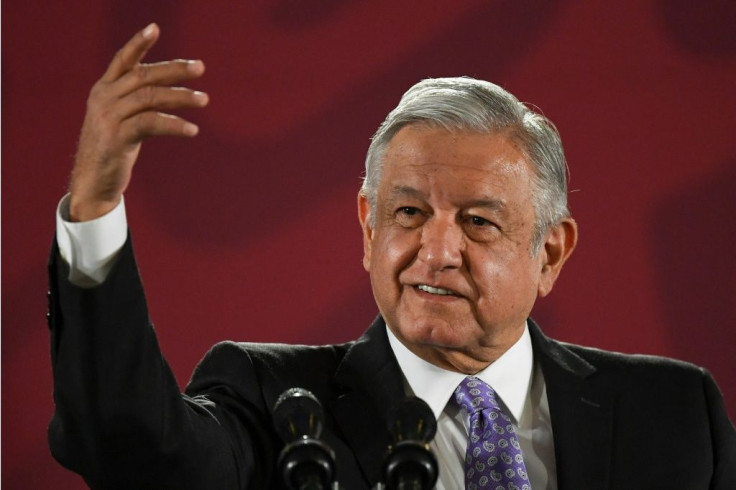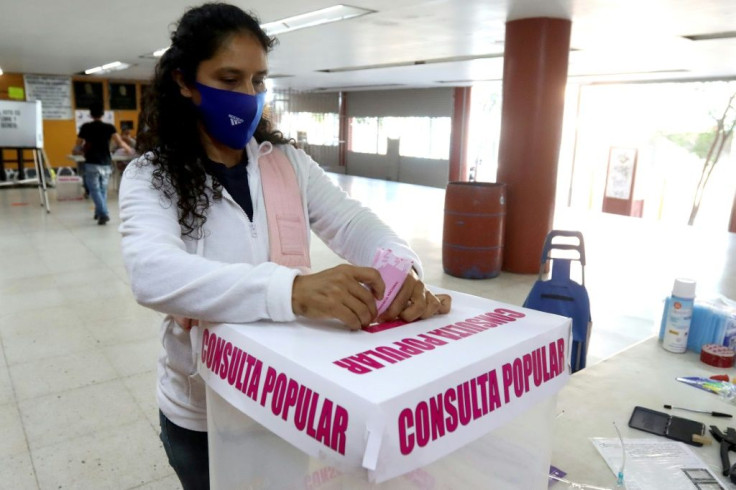Mexico Referendum On Prosecuting Ex-presidents Draws Few Voters
A national referendum pushed by Mexican President Andres Manuel Lopez Obrador on whether to prosecute his predecessors for alleged corruption drew only a small fraction of voters to the polls on Sunday.
Turnout was little more than seven percent -- far from the 40 percent necessary for it to have any legal bearing, the National Electoral Institute (INE) said based on an official quick count.
As expected, the "yes" vote for legal action was far ahead, in an estimated range of 89-96 percent, compared with less than two percent for "no," INE president Lorenzo Cordova said.
Lopez Obrador, a self-styled anti-graft crusader, said the public consultation would strengthen participatory democracy, but critics saw it as little more than a political stunt.
"A consultation wasn't necessary to know that the people want corruption to be punished," Jose Antonio Crespo, a political analyst at the Center for Research and Teaching in Economics, told AFP.
"The prosecution will simply do what the president tells it, because even if it's formally autonomous, we've seen in practice that it is not," he added.
Rosario Gomez was among the minority determined to vote.

"It's about time these thieves pay!" the 52-year-old market vendor said.
Montserrat Rosas, a 25-year-old civil servant voting in Mexico City, said that although the referendum itself would not put the former leaders on trial, it brings "hope that justice will be done."
The INE set up around 57,000 ballot boxes, compared with more than 160,000 for June's legislative and local elections, and carried out limited promotion activities citing a lack of resources.
That annoyed Lopez Obrador, who has repeatedly criticized the poll body and accused it of endorsing "fraud" in the past.
"It's not true that the INE doesn't want the consultation," said Cordova.

Mexico is ranked 124th out of 179 on Transparency International's world corruption perceptions index.
But former presidents can be tried like any other citizen, and critics argued that the referendum was unnecessary.
"Waiting for the results of a consultation is making justice a political circus," said Jose Miguel Vivanco, regional director of New York-based Human Rights Watch.
Although the vote was Lopez Obrador's brainchild, the 67-year-old ruled out voting himself because he did not want "corrupt and hypocritical conservatism" to accuse him of vindictiveness.
The referendum question proposed by Lopez Obrador named five predecessors: Carlos Salinas, Ernesto Zedillo, Vicente Fox, Felipe Calderon, and Enrique Pena Nieto, whose terms in power stretched from 1988 to 2018.
Lopez Obrador has accused them of presiding over "excessive concentration of wealth, monumental losses to the treasury, privatization of public property, and widespread corruption," drawing angry denials.
In the end, the Supreme Court modified the referendum question for a more ambiguous alternative.
"Not even the lawyers understand it," analyst Paula Sofia Vazquez told AFP.
The question read: "Do you agree or not that the pertinent actions be carried out, in accordance with the constitutional and legal framework, to undertake a process of clarification of the political decisions made in the past years by the political actors, aimed at guaranteeing justice and the rights of potential victims?"
Omar Garcia, a survivor of the disappearance and presumed murder of 43 students in 2014, allegedly at the hands of corrupt police and drug traffickers, said listening to the people was valid even if it was not binding.
"It does encourage an end to impunity," Garcia said.
But 59-year-old manager Monica Ortiz-Monasterio was among those staying away from the polls, saying it was "the final straw to ask if crimes are prosecuted or left unpunished."
© Copyright AFP 2024. All rights reserved.











